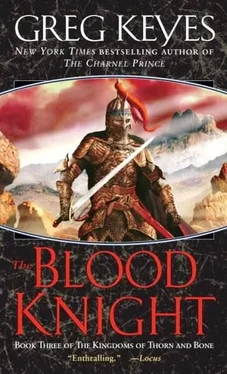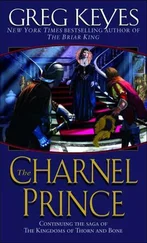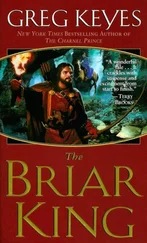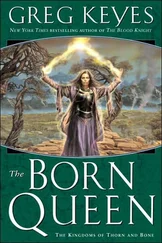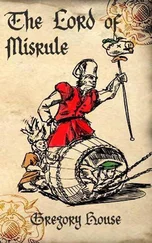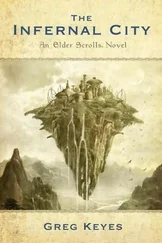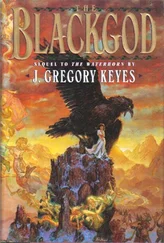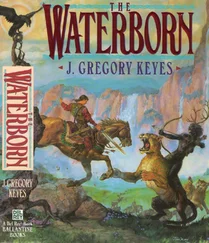“Now you,” Robert said, turning toward Cazio.
Rut it wasn’t the first time Cazio had faced a man who couldn’t die or, for that matter, a sword he couldn’t parry. As Robert cocked for the cut, he lunged long and stop-hit the prince in the wrist. Robert snarled and slashed at Acredo’s blade, but Cazio disengaged and stabbed him in the wrist a second time. Then, avoiding the next, even wilder blow, Cazio made a draw-cut to the top of Robert’s hand.
“Not much of a swordsman, are you?” he said, grinning, bouncing on the balls of his feet. “Even with a sword like that.”
Robert rushed him then, but again Cazio avoided the beat at his blade and sidestepped the charge as one might a bull, leaving his blade in a high line for Robert to run into. The usurper did, the blade taking him in the forehead so that his skull stopped and his feet went flying out from under him. Cazio had the great pleasure of seeing the bastard land flat on his back.
“ Zo dessrator, nip zo chiado ,” he pointed out.
He had to say it quickly, however, for Robert’s men—and womenwere swarming all around. He placed himself as best he could in front of Anne, engaging two, then three, and finally and impossibly four. He saw Preston and Cuelm fall, and then it was just he, standing between the three woman and the mob.
Worse, he saw Robert in the background, dabbing a cloth at his pierced head.
“Kill them all,” he heard Robert shout. “I’ve lost all patience with this business.”
Aspar threw his arms around the trunk of the fir and gritted his teeth as his body stripped the topmost branches. The scent of resin exploded in his nostrils as the treetop bent earthward under his weight, and for a moment he felt like the jungen who once had ridden saplings to the ground for fun.
This one wasn’t going all the way to the ground, though, so he let go before it could snap him back up. That left him falling another five kingsyards into shallow water that was still draining off from the woorm’s eruption.
He was lucky. The water didn’t hide a boulder or a stump, but it still felt as if a palm the size of a boy had slapped him with all its might.
The pain galvanized him rather than slowing him down, and he managed to slosh to his feet and take stock of the situation.
Aspar couldn’t see the woorm just now, but he could hear it crashing through the forest. He spun and ran toward the base of the cliff, hoping against hope that he would find his bow and the precious arrow. But though the water was receding, it left in its wake ajumbled mess of sticks, leaves, and needles. It could take him a bell—or ten—to find his gear.
He still didn’t see the woorm, but he drew his dirk and, reaching for his ax, encountered the horn where he’d tucked it in his belt. He plucked it out, staring at it for a moment.
Why not? He didn’t have much to lose at this point.
He raised the horn to his lips, took the deepest breath he could manage, and blew a shrill high note that he remembered very well from a day not long gone. Even after he ran out of breath, the peal hung in the air, reluctant to fade.
But fade it did, and the woorm was still coming.
He’d reached the cliff now, and fortune favored him a bit; his bow-stave was caught in the lowest branches of an everic. But he didn’t see the arrow anyplace, and the woorm—
—was suddenly turning away from him, moving out of the canyon.
But something was still coming, something man-sized and moving far too quickly for a man.
“Sceat,” he groaned. “Not a another one of these bloody—”
But the» the monk was on him, his sword a barely visible gleam in the dusk.
Stephen stiffened as the high clear note of a horn sounded in the evening air.
Zemlé noticed. “What is it?”
“I recognize that horn,” he said. “That’s the Briar King’s horn. The one I blew, the one that summoned him.”
“What does it mean?”
“I don’t know,” Stephen replied absently.
Below, the khriim had been doing unusual things. Instead of moving straight toward the praifec and his men, it had gone off through the trees, in the direction of the cliffside. Just after the horn blew, however, it resumed its course, moving toward the approaching war band.
Stephen felt a tingle as a line of eight horsemen formed and charged the creature. He wondered if they stood a chance. A knight, a horse, armor, and barding at a dead gallop all concentrated on the steel tip of a lance was a formidable force.
He saw the Sefry warriors now, as well: twelve small figures approaching the praifec’s men at a trot. He caught an actinic glitter and realized that they had feyswords, like the knight he and his companions had fought in Dunmrogh.
The riders broke against the khriim like waves against a rock, except that a broken wave flowed back out to sea. The horsemen and their horses lay where they fell.
So much for that.
Stephen felt something move across his skin, and all the hairs on his arm stood up. He wasn’t cold, but he shivered.
“The horn…” he murmured.
“What’s that?” Zemlé gasped. She pointed, and Stephen saw a dark cloud approaching, or so it appeared to be at first glance.
But it wasn’t a cloud; rather, it was a collection of thousands of smaller things, flying close together.
“Birds,” he said.
They were of all sorts—corbies, martins, swans, hawks, curlewsand all were crying or singing, making whatever noise they made and raising the strangest cacophony Stephen had ever heard. When they reached the valley, they began spiraling down into the forest, forming an avian tornado.
The forest itself was behaving in an equally peculiar manner. An acre of it was moving; the trees were bending toward one another, knitting their limbs together. Stephen was reminded of the effect of the dreodh song on the tree they’d fled the slinders into, but if it was the same magic, it was far stronger.
“Saints,” Zemlé breathed.
“I don’t think the saints have much to do with this,” Stephen murmured as he watched the birds descend into the quickening forest and vanish as if swallowed.
A shape was forming now, a shape Stephen recognized, albeit larger than he had ever seen it before, maybe thirty kingsyards high.
Moments later, antlers spreading from his head, the Briar King tore his roots from the earth and began to stride purposefully toward the khriim.
Aspar waited until the last second and hurled his ax. The monk tried to turn, but that was the thing about moving fast: it made it harder to change direction. His attempt only spoiled the cut meant to take Aspar’s head off. It soughed over the holter’s head instead as the attacker hurled past.
Aspar turned to find the fellow already coming back, but he was delighted to see that his ax had found its mark and savaged the man’s weapon arm, the right one. The sword lay discarded on the waterlogged moss, and blood was pumping from his biceps.
He was a little slower, but not much. His left fist arced out in a blur; Aspar felt as if he were moving underwater as the knuckles connected with his chin. He smelled blood, and his head rang like a bell as he stumbled back.
The next blow dug into his flank and broke ribs.
With an inarticulate cry, Aspar threw his left arm around the man, stabbing at the monk’s kidney with his dirk, but the blade never made contact. Instead the fellow twisted oddly, and Aspar found himself somehow hurled into a tree.
His vision flashed black and red, but he knew he couldn’t stop moving, so he rolled to the side and tried to get to his feet, spitting out fragments of his teeth. He grabbed a sapling and used it to pull himself up.
It was only when he tried to put weight on his leg that he realized it was broken.
Читать дальше
